A Brief Biography of Benjamin Banneker, 1791
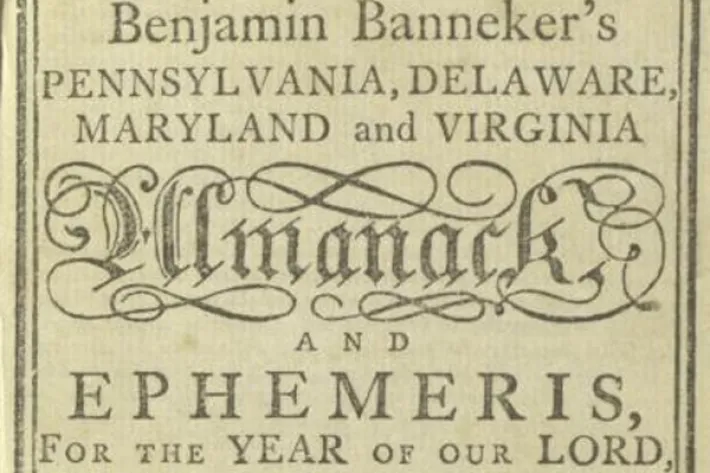
Benjamin Banneker’s Pennsylvania, Delaware, Maryland and Virginia Almanack and Ephemeris, for the Year of Our Lord 1792. (Library of Congress)
In 1791, Benjamin Banneker completed his first almanac. The volume was published by two Baltimore-based editors, William Goddard and James Angell, who presented Banneker as living proof that African Americans are the intellectual equals of whites. In their introduction to the almanac, they included the following account of Banneker’s life and accomplishments by his friend James McHenry, a white businessman and Maryland politician.
Letter from James McHenry to William Goddard and James Angell, August 20, 1791
Baltimore, August 20, 1791.
Messrs. GODDARD and ANGELL, BENJAMIN BANNEKER, a free NEGRO, has calculated an ALMANACK, for the ensuing year, 1792, which being desirous to dispose of, to the best advantage, he has requested me to aid his application to you for that purpose. Having fully satisfied myself, with respect to his title to this kind of authorship, if you can agree with him for the price of his work, I may venture to assure you it will do you credit, as Editors, while it will afford you the opportunity to encourage talents that have thus far surmounted the most discouraging circumstances and prejudices.
This Man is about fifty-nine years of age; he was born in Baltimore County; his father was an African, and his mother the offspring of African parents.—His father and mother having obtained their freedom, were enabled to send him to an obscure school, where he learned, when a boy, reading, writing, and arithmetic as far as double position; and to leave him, at their deaths, a few acres of land, upon which he has supported himself ever since by means of economy and constant labour, and preserved a fair reputation. To struggle incessantly against want is no ways favourable to improvement: What he had learned, however, he did not forget; for as some hours of leisure will occur in the most toilsome life, he availed himself of these, not to read and acquire knowledge from writings of genius and discovery, for of such he had none, but to digest and apply, as occasions presented, the few principles of the few rules of arithmetic he had been taught at school. This kind of mental exercise formed his chief amusement, and soon gave him a facility in calculation that was often serviceable to his neighbours, and at length attracted the attention of the Messrs. Ellicotts, a family remarkable for their ingenuity and turn to the useful mechanics. It is about three years since Mr. George Ellicott lent him Mayer’s Tables, Ferguson’s Astronomy, Leadbeater’s Lunar-Tables, and some astronomic instruments, but without accompanying them with either hint or instruction, that might further his studies, or lead him to apply them to any useful result. These books and instruments, the first of the kind he had ever seen, opened a new world to Benjamin, and from thenceforward he employed his leisure in astronomical researches. He now took up the idea of the calculations for an ALMANACK, and actually completed an entire set for the last year, upon his original stock of arithmetic. Encouraged by this first attempt, he entered upon his calculation for 1792, which, as well as the former, he began and finished without the least information, or assistance, from any person, or other books than those I have mentioned; so that, whatever merit is attached to his present performance, is exclusively and peculiarly his own.
I have been the more careful to investigate those particulars, and to ascertain their reality, as they form an interesting fact in the History of Man; and as you may want them to gratify curiosity, I have no objection to your selecting them for your account of Benjamin.
I consider this Negro as a fresh proof that the powers of the mind are disconnected with the colour of the skin, or, in other words, a striking contradiction to Mr. Hume’s doctrine, that “the Negroes are naturally inferior to the whites, and unsusceptible of attainments in arts and sciences.” In every civilized country we shall find thousands of whites, liberally educated, and who have enjoyed greater opportunities of instruction than this Negro, his inferiors in those intellectual acquirements and capacities that form the most characteristic feature in the human race. But the system that would assign to these degraded blacks an origin different from the whites, if it is not ready to be deserted by philosophers, must be relinquished as similar instances multiply; and that such must frequently happen cannot well be doubted, should no check impede the progress of humanity, which, meliorating the condition of slavery, necessarily leads to its final extinction.—Let, however, the issue be what it will, I cannot but wish, on this occasion, to see the Public patronage keep pace with my black friend’s merit.
I am, Gentlemen, your most obedient servant,
JAMES McHENRY.
Document Source: James McHenry, Letter to William Goddard and James Angell (Baltimore, August 20, 1791), printed in Benjamin Banneker’s Pennsylvania, Delaware, Maryland and Virginia Almanack and Ephemeris, for the Year of Our Lord 1792. Being Bissextile, or Leap-Year, and the Sixteenth Year of American Independence, Which Commenced July 4, 1776 (Baltimore: William Goddard and James Angell, [1791]), pp. 2-4.
Letter from James McHenry to William Goddard and James Angell, August 20, 1791
Baltimore, August 20, 1791.
Messrs. GODDARD and ANGELL,
BENJAMIN BANNEKER, a free NEGRO, has calculated an ALMANACK, for the ensuing year, 1792 . . . he has requested me to aid his application to you for that purpose. Having fully satisfied myself, with respect to his title to this kind of authorship, if you can agree with him for the price of his work . . .
This Man is about fifty-nine years of age; he was born in Baltimore County; his father was an African, and his mother the offspring of Africanparents. His father and mother having obtained their freedom, were enabled to send him to an obscure school, where he learned . . . reading, writing, and arithmetic . . . and to leave him, at their deaths, a few acres of land, upon which he has supported himself ever since by means . . . constant labour, and preserved a fair reputation . . . he employed his leisure in astronomical researches. He now took up the idea of the calculations for an ALMANACK . . .
I consider this Negro as a fresh proof that the powers of the mind are disconnected with the colour of the skin, or, in other words, a striking contradiction to Mr. Hume’s doctrine, that “the Negroes are naturally inferior to the whites, and unsusceptible of attainments in arts and sciences.” In every civilized country we shall find thousands of whites, liberally educated, and who have enjoyed greater opportunities of instruction than this Negro . . . But the system that would assign to these degraded blacks an origin different from the whites . . must be relinquished as similar instances multiply . . . should no check impede the progress of humanity, which, meliorating the condition of slavery, necessarily leads to its final extinction . . .
I am, Gentlemen, your most obedient servant,
JAMES McHENRY.
Source: James McHenry, Letter to William Goddard and James Angell (Baltimore, August 20, 1791), printed in Benjamin Banneker’s Pennsylvania, Delaware, Maryland and Virginia Almanack and Ephemeris, for the Year of Our Lord 1792. Being Bissextile, or Leap-Year, and the Sixteenth Year of American Independence, Which Commenced July 4, 1776(Baltimore: William Goddard and James Angell,[1791]), pp. 2&ndash4.
meliorating - make better or more tolerable
Background
In 1791, Benjamin Banneker completed his first almanac. The volume was published by two Baltimore-based editors, William Goddard and James Angell, who presented Banneker as living proof that African Americans are the intellectual equals of whites. In their introduction to the almanac, they included the following account of Banneker’s life and accomplishments by his friend James McHenry, a white businessman and Maryland politician.
Transcript
Letter from James McHenry to William Goddard and James Angell, August 20, 1791
Baltimore, August 20, 1791.
Messrs. GODDARD and ANGELL, BENJAMIN BANNEKER, a free NEGRO, has calculated an ALMANACK, for the ensuing year, 1792, which being desirous to dispose of, to the best advantage, he has requested me to aid his application to you for that purpose. Having fully satisfied myself, with respect to his title to this kind of authorship, if you can agree with him for the price of his work, I may venture to assure you it will do you credit, as Editors, while it will afford you the opportunity to encourage talents that have thus far surmounted the most discouraging circumstances and prejudices.
This Man is about fifty-nine years of age; he was born in Baltimore County; his father was an African, and his mother the offspring of African parents.—His father and mother having obtained their freedom, were enabled to send him to an obscure school, where he learned, when a boy, reading, writing, and arithmetic as far as double position; and to leave him, at their deaths, a few acres of land, upon which he has supported himself ever since by means of economy and constant labour, and preserved a fair reputation. To struggle incessantly against want is no ways favourable to improvement: What he had learned, however, he did not forget; for as some hours of leisure will occur in the most toilsome life, he availed himself of these, not to read and acquire knowledge from writings of genius and discovery, for of such he had none, but to digest and apply, as occasions presented, the few principles of the few rules of arithmetic he had been taught at school. This kind of mental exercise formed his chief amusement, and soon gave him a facility in calculation that was often serviceable to his neighbours, and at length attracted the attention of the Messrs. Ellicotts, a family remarkable for their ingenuity and turn to the useful mechanics. It is about three years since Mr. George Ellicott lent him Mayer’s Tables, Ferguson’s Astronomy, Leadbeater’s Lunar-Tables, and some astronomic instruments, but without accompanying them with either hint or instruction, that might further his studies, or lead him to apply them to any useful result. These books and instruments, the first of the kind he had ever seen, opened a new world to Benjamin, and from thenceforward he employed his leisure in astronomical researches. He now took up the idea of the calculations for an ALMANACK, and actually completed an entire set for the last year, upon his original stock of arithmetic. Encouraged by this first attempt, he entered upon his calculation for 1792, which, as well as the former, he began and finished without the least information, or assistance, from any person, or other books than those I have mentioned; so that, whatever merit is attached to his present performance, is exclusively and peculiarly his own.
I have been the more careful to investigate those particulars, and to ascertain their reality, as they form an interesting fact in the History of Man; and as you may want them to gratify curiosity, I have no objection to your selecting them for your account of Benjamin.
I consider this Negro as a fresh proof that the powers of the mind are disconnected with the colour of the skin, or, in other words, a striking contradiction to Mr. Hume’s doctrine, that “the Negroes are naturally inferior to the whites, and unsusceptible of attainments in arts and sciences.” In every civilized country we shall find thousands of whites, liberally educated, and who have enjoyed greater opportunities of instruction than this Negro, his inferiors in those intellectual acquirements and capacities that form the most characteristic feature in the human race. But the system that would assign to these degraded blacks an origin different from the whites, if it is not ready to be deserted by philosophers, must be relinquished as similar instances multiply; and that such must frequently happen cannot well be doubted, should no check impede the progress of humanity, which, meliorating the condition of slavery, necessarily leads to its final extinction.—Let, however, the issue be what it will, I cannot but wish, on this occasion, to see the Public patronage keep pace with my black friend’s merit.
I am, Gentlemen, your most obedient servant,
JAMES McHENRY.
Document Source: James McHenry, Letter to William Goddard and James Angell (Baltimore, August 20, 1791), printed in Benjamin Banneker’s Pennsylvania, Delaware, Maryland and Virginia Almanack and Ephemeris, for the Year of Our Lord 1792. Being Bissextile, or Leap-Year, and the Sixteenth Year of American Independence, Which Commenced July 4, 1776 (Baltimore: William Goddard and James Angell, [1791]), pp. 2-4.
Excerpt
Letter from James McHenry to William Goddard and James Angell, August 20, 1791
Baltimore, August 20, 1791.
Messrs. GODDARD and ANGELL,
BENJAMIN BANNEKER, a free NEGRO, has calculated an ALMANACK, for the ensuing year, 1792 . . . he has requested me to aid his application to you for that purpose. Having fully satisfied myself, with respect to his title to this kind of authorship, if you can agree with him for the price of his work . . .
This Man is about fifty-nine years of age; he was born in Baltimore County; his father was an African, and his mother the offspring of Africanparents. His father and mother having obtained their freedom, were enabled to send him to an obscure school, where he learned . . . reading, writing, and arithmetic . . . and to leave him, at their deaths, a few acres of land, upon which he has supported himself ever since by means . . . constant labour, and preserved a fair reputation . . . he employed his leisure in astronomical researches. He now took up the idea of the calculations for an ALMANACK . . .
I consider this Negro as a fresh proof that the powers of the mind are disconnected with the colour of the skin, or, in other words, a striking contradiction to Mr. Hume’s doctrine, that “the Negroes are naturally inferior to the whites, and unsusceptible of attainments in arts and sciences.” In every civilized country we shall find thousands of whites, liberally educated, and who have enjoyed greater opportunities of instruction than this Negro . . . But the system that would assign to these degraded blacks an origin different from the whites . . must be relinquished as similar instances multiply . . . should no check impede the progress of humanity, which, meliorating the condition of slavery, necessarily leads to its final extinction . . .
I am, Gentlemen, your most obedient servant,
JAMES McHENRY.
Source: James McHenry, Letter to William Goddard and James Angell (Baltimore, August 20, 1791), printed in Benjamin Banneker’s Pennsylvania, Delaware, Maryland and Virginia Almanack and Ephemeris, for the Year of Our Lord 1792. Being Bissextile, or Leap-Year, and the Sixteenth Year of American Independence, Which Commenced July 4, 1776(Baltimore: William Goddard and James Angell,[1791]), pp. 2&ndash4.
meliorating - make better or more tolerable
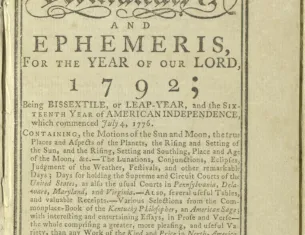
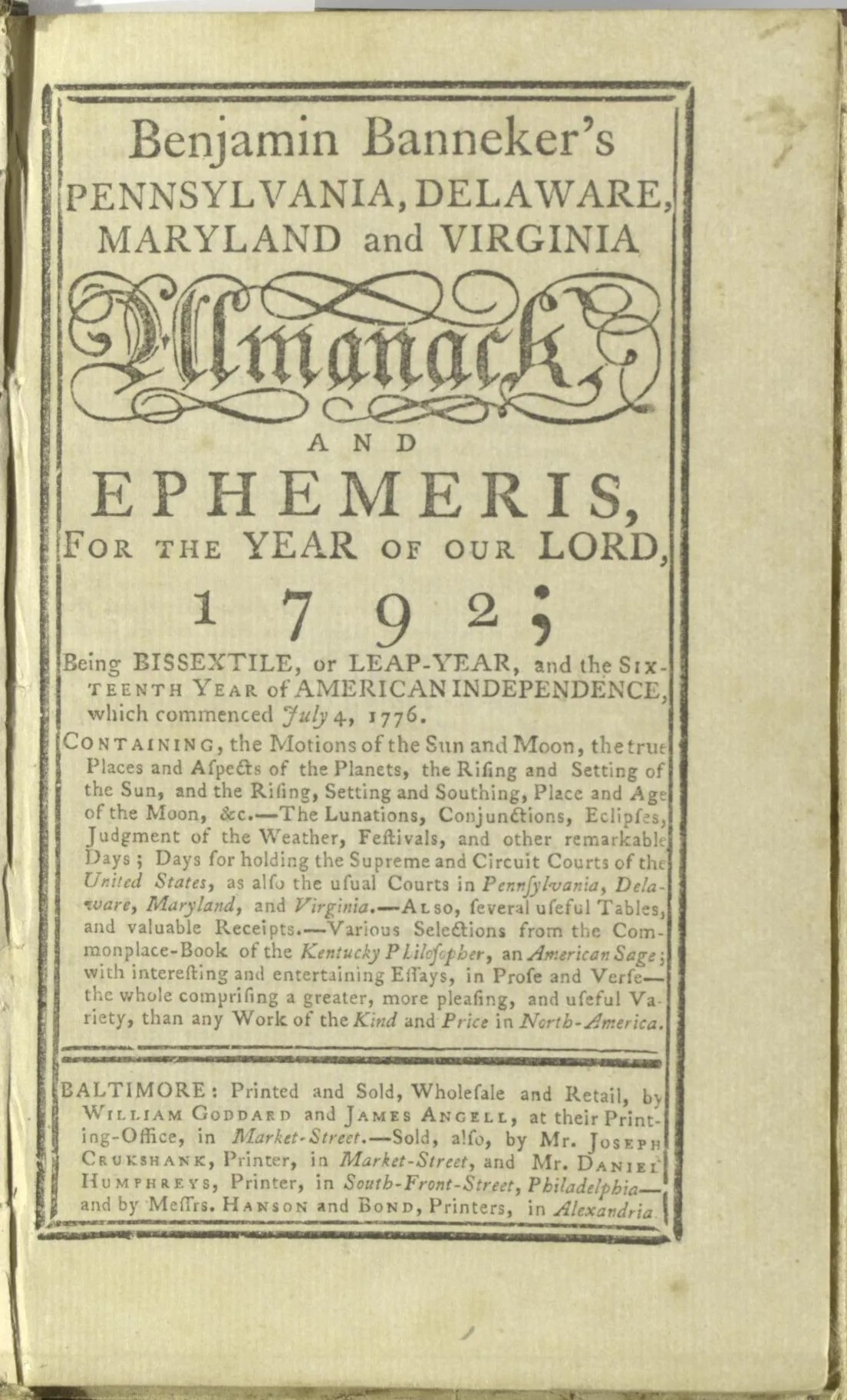
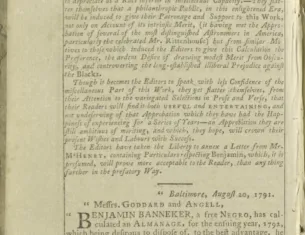
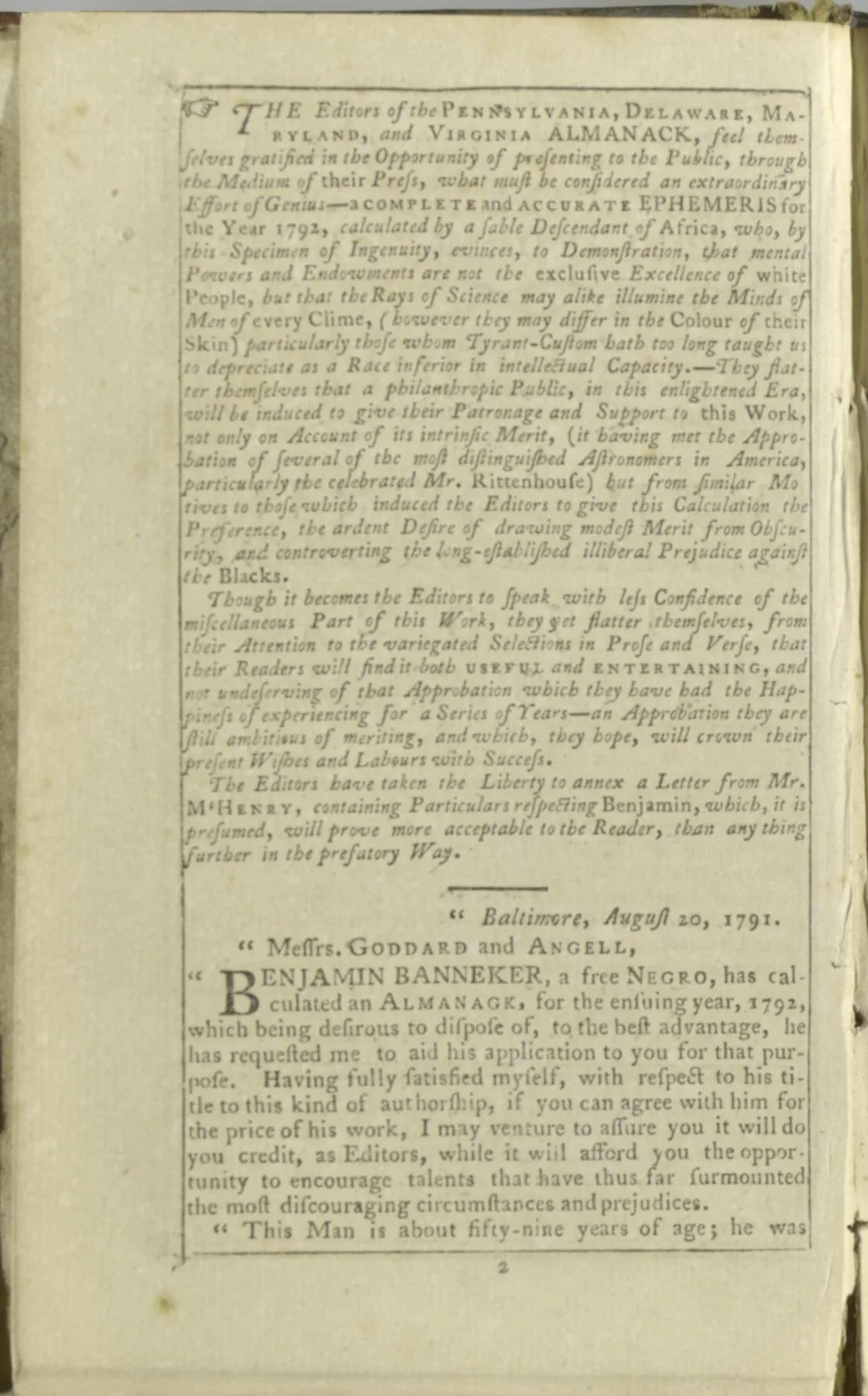
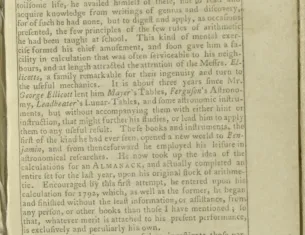
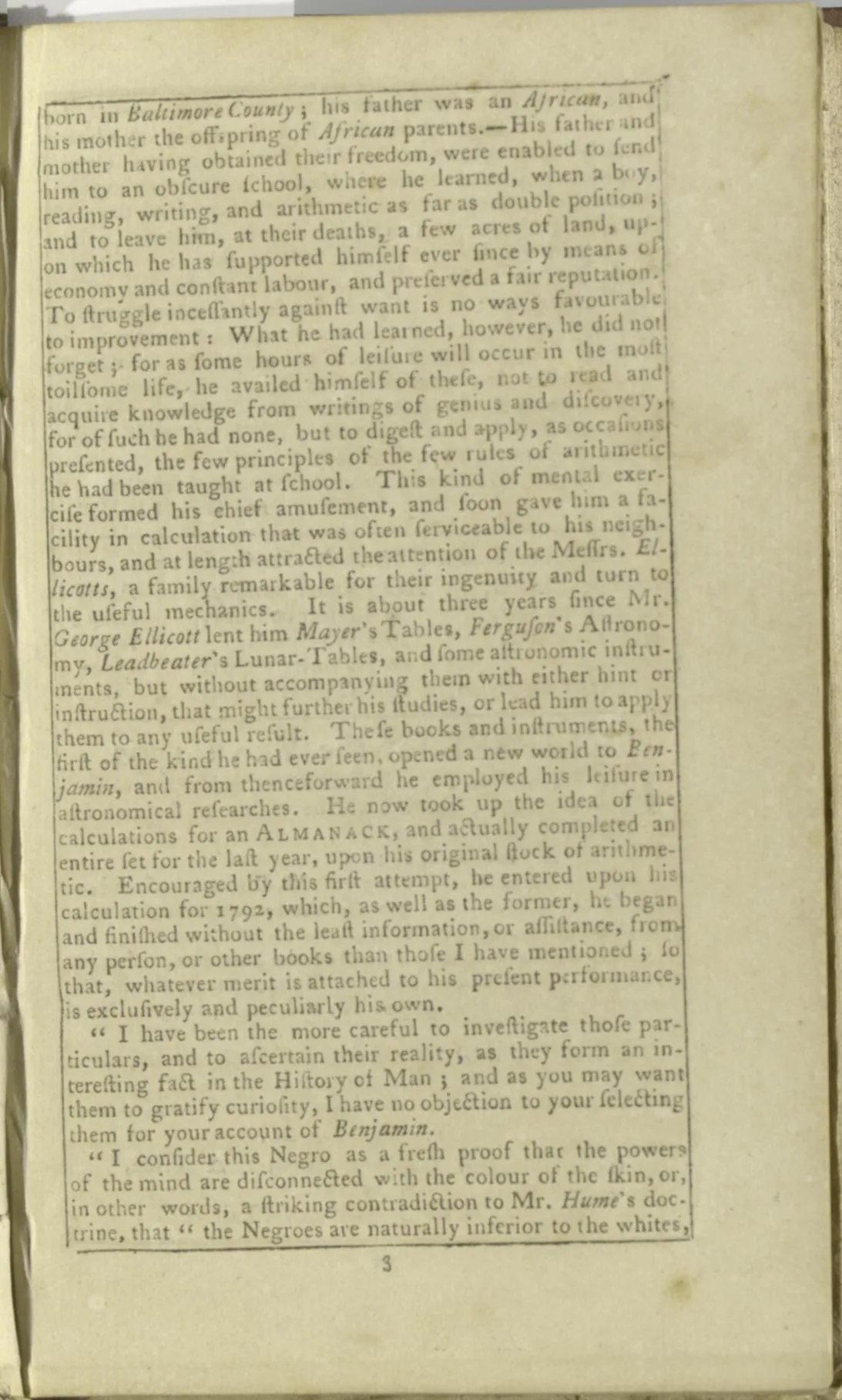
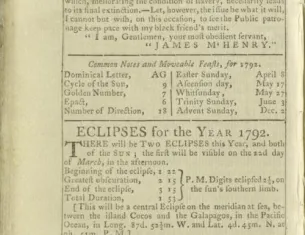
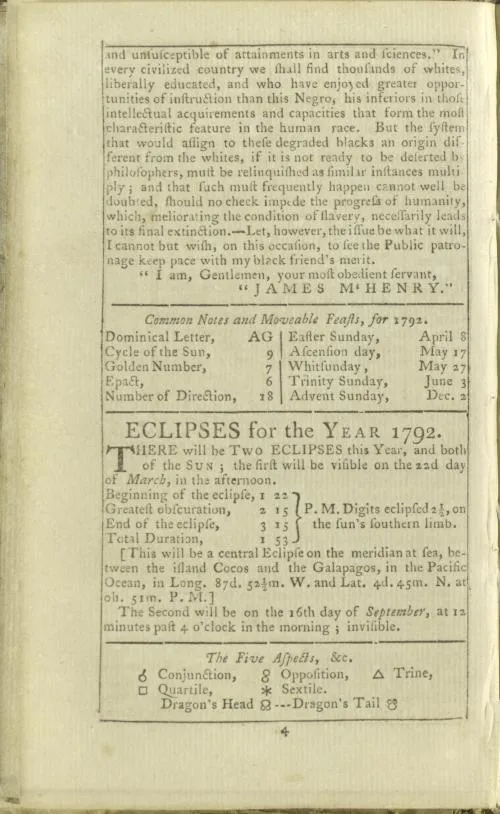
![Benjamin Banneker, from the title page of "Benjamin Bannaker's [sic] Pennsylvania, Delaware, Maryland, and Virginia Almanac, for the Year of Our Lord 1795" (Maryland Historical Society)](/sites/default/files/styles/research_thumbnail/public/2023-10/ms2700_banneker2RET.png.webp?itok=xv1YyBkk)